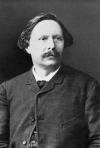Édouard Schuré poet from France was born on January 21, 1841, had 88 years and died on April 7, 1929. Poems were written mainly in English language. Dominant movement is other.
Biography
Schuré was the son of a doctor in the Alsatian town of Strasbourg. He mastered French as well as German, and was influenced by German and French culture in his formative years. Without interest, he studied law at his fathers pleasure. His own interest and studies led to an extensive knowledge of German literature. The discovery of Richard Wagner's "music drama" Tristan and Isolde impressed him sufficiently to seek—and obtain—Wagner's personal acquaintance.
In France, he published his first work Histoire du Lied—a history of the German folk song, which earned him some recognition in the country of his family. With the publication of the essay Richard Wagner et le drame musical, he established himself as a major French Wagner expert and advocate of the time.
When the Franco-German war of 1870-71 poisoned the German arts for many French, it would seem that Schuré was not immune from this influence. His nationalism is reflected in his remarks of this time—and later in his life—in a comparison of glorified Celtism (France) and a negatively viewed "Teutonism" (Germany).
On a trip to Italy during this time he met, twenty years his junior, a Greek girl, Marguerita Albana Mignaty, whom he subsequently described as his "muse", although he himself was married.
After the tide of war had ebbed, Schuré reestablished his relationship with Wagner. In 1873, he met the German philosopher Friedrich Nietzsche; with frequent contact they shared enthusiasm for Wagner. The cultist veneration of Wagner, however, seeded Schuré's alienation from the composer.
Schuré now turned increasingly to the esoteric and the occult. His major influence being the famous French occultist-scholar Fabre d'Olivet. In 1884, he met the founder of the Theosophical Society Helena Petrovna Blavatsky. Although unwelcome in the Theosophical Society, he nevertheless entered. In 1889, he published, after some smaller works on similar topics, his major work Les Grands Initiés (The Great Initiates).
In 1900, the actress Marie von Sivers came into contact with him because she intended to translate one of his works into German. At the German Section of the Theosophical Society, he met the Austrian philosopher and later founder of Anthroposophy, Rudolf Steiner. In 1906, Sivers brought about a meeting between Schuré and Steiner. Schuré was deeply impressed and thought of Steiner as one 'initiated' in line with his The Great Initiates. Subsequently, Steiner and von Sivers brought the esoteric Schuré dramas to the stage.
With the outbreak of World War I, Schuré's relationship with Steiner and his wife became strained. Schuré threw in the two secret intentions about Germanic and Pan and stepped out of Steiner's Anthroposophical Society. Four years after the war, Schuré reconsolidated his friendship with Steiner.
In subsequent years, Schuré published his autobiography and a French translation of Steiner's work Christianity as Mystical Fact as well as The Mysteries of Antiquity chrétien (French: Le Mystère et les mystères antiques).






